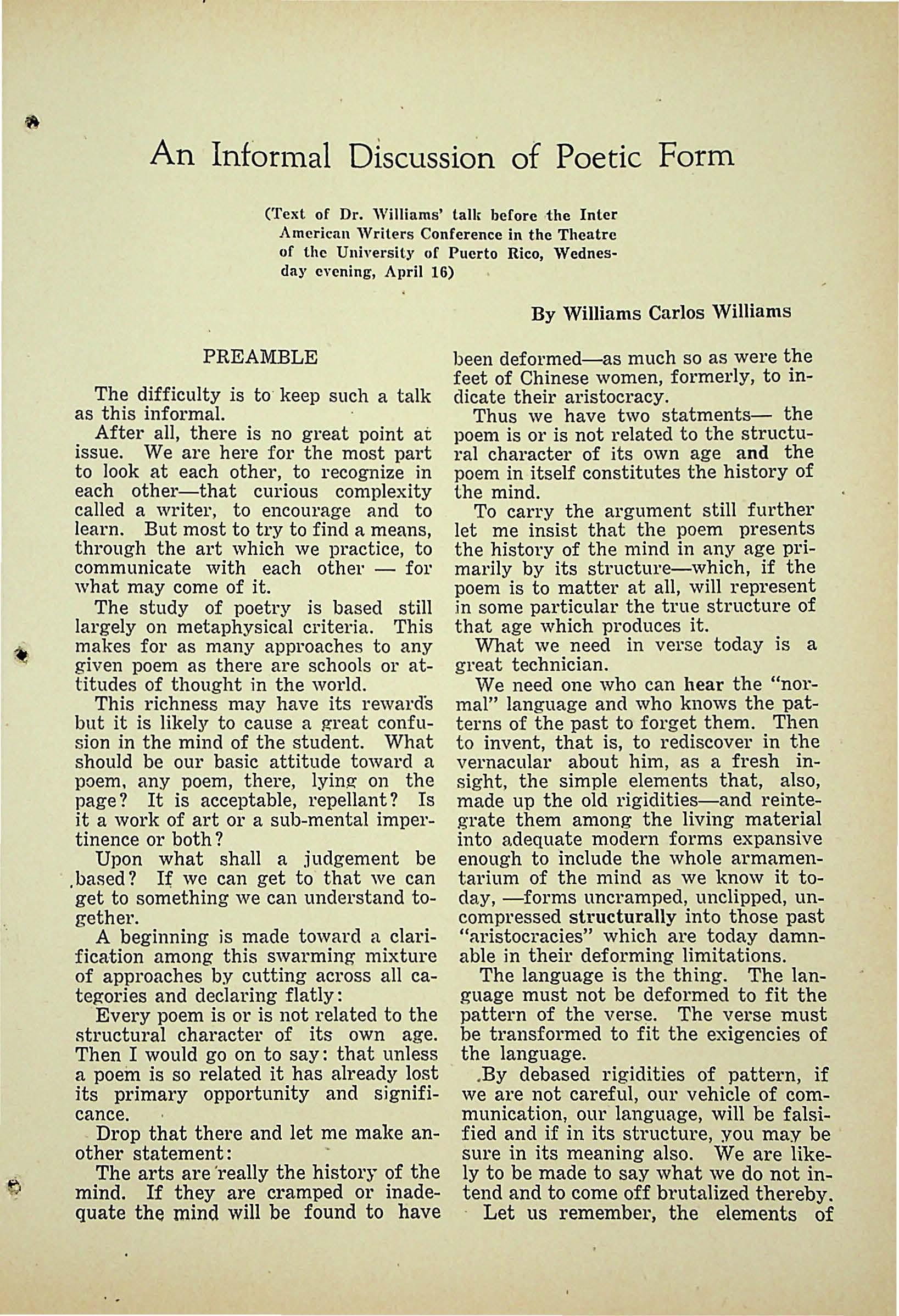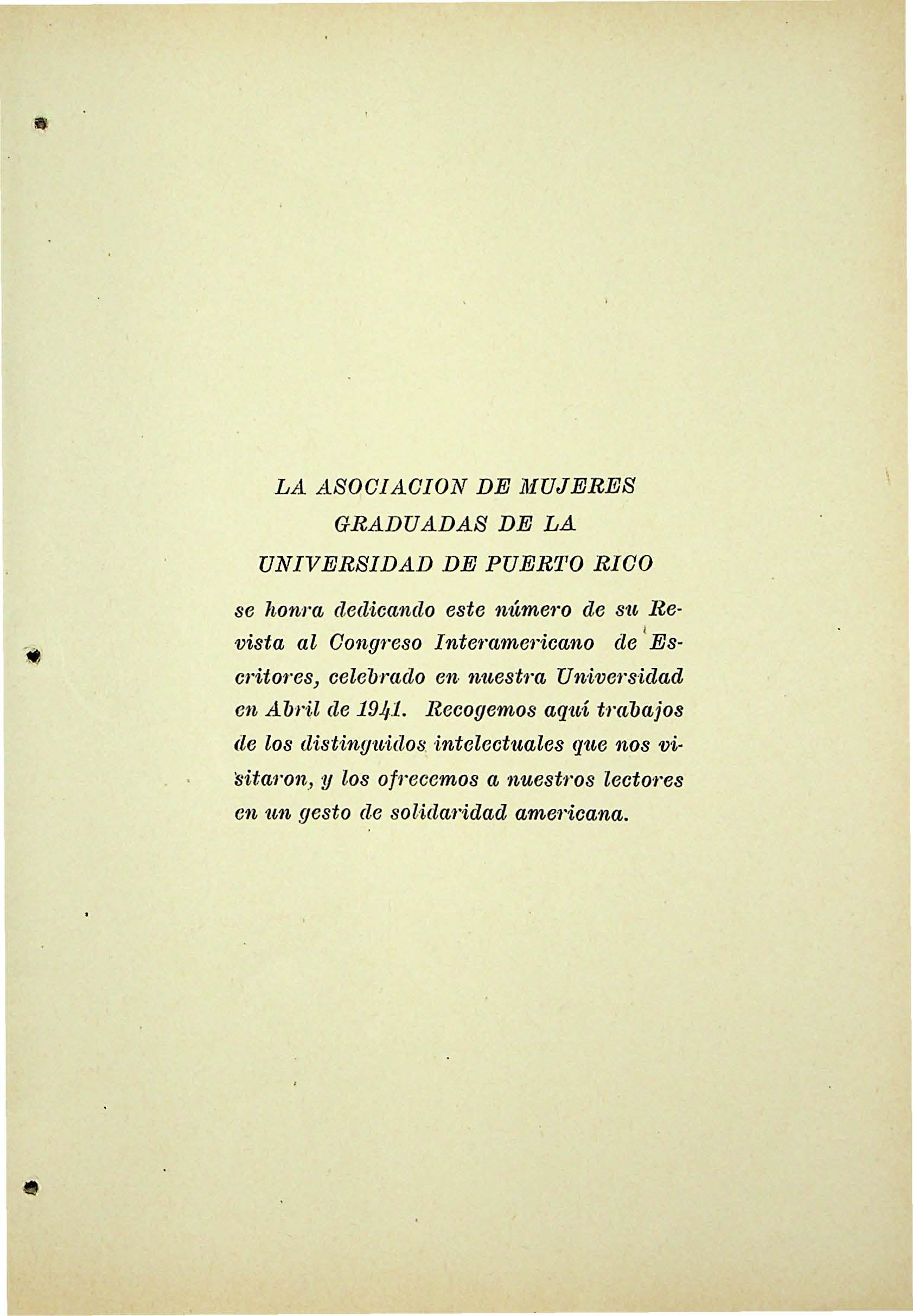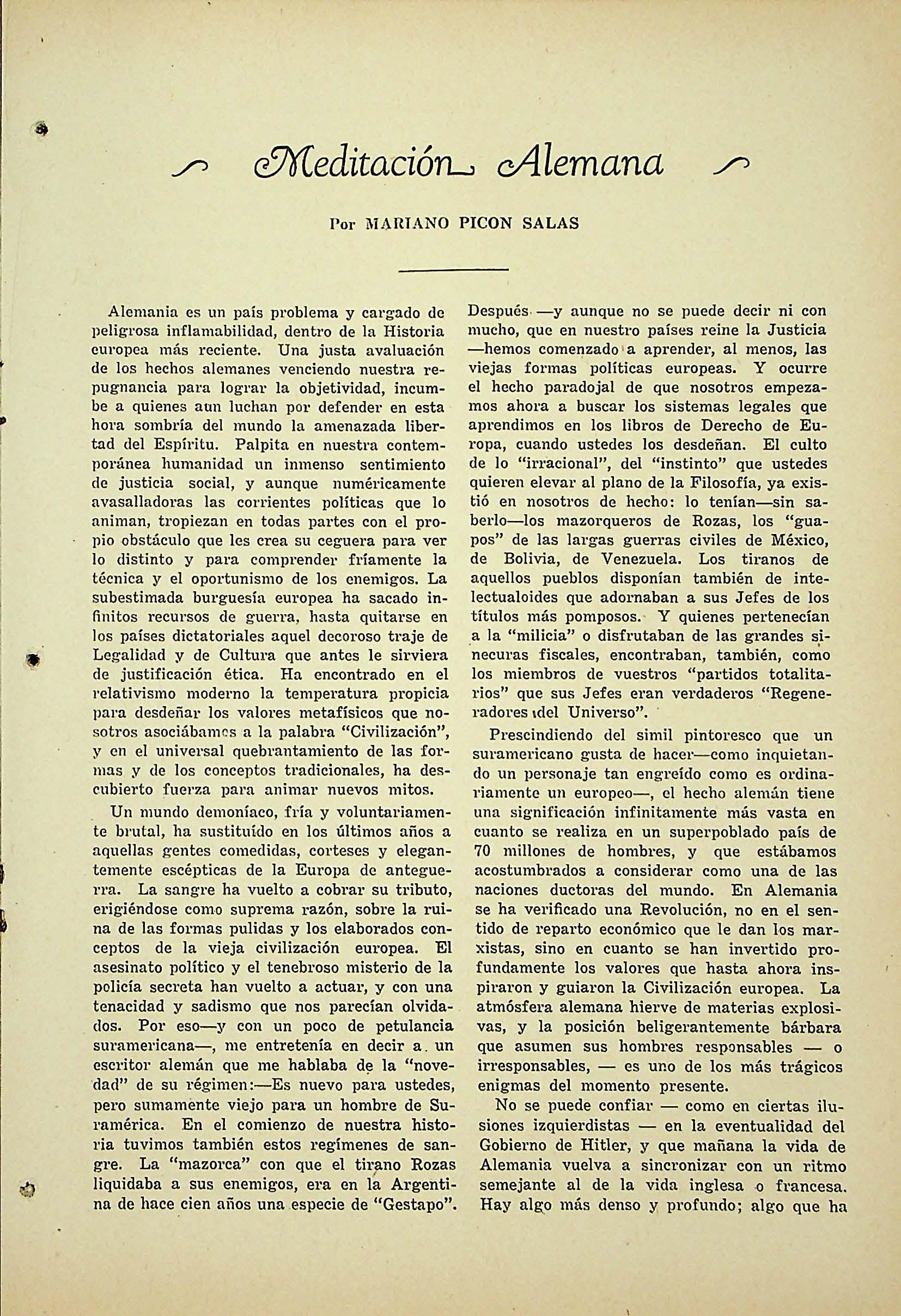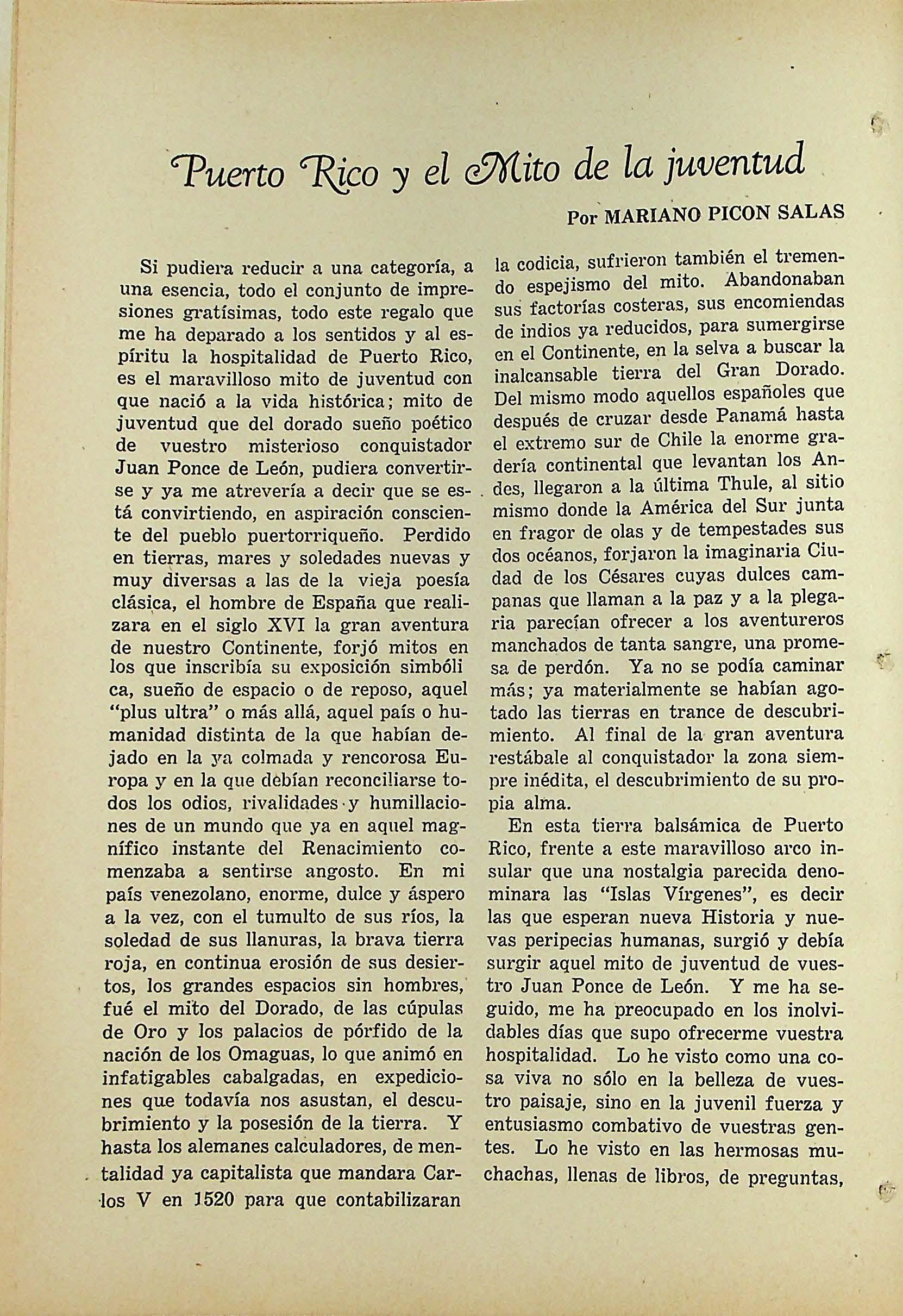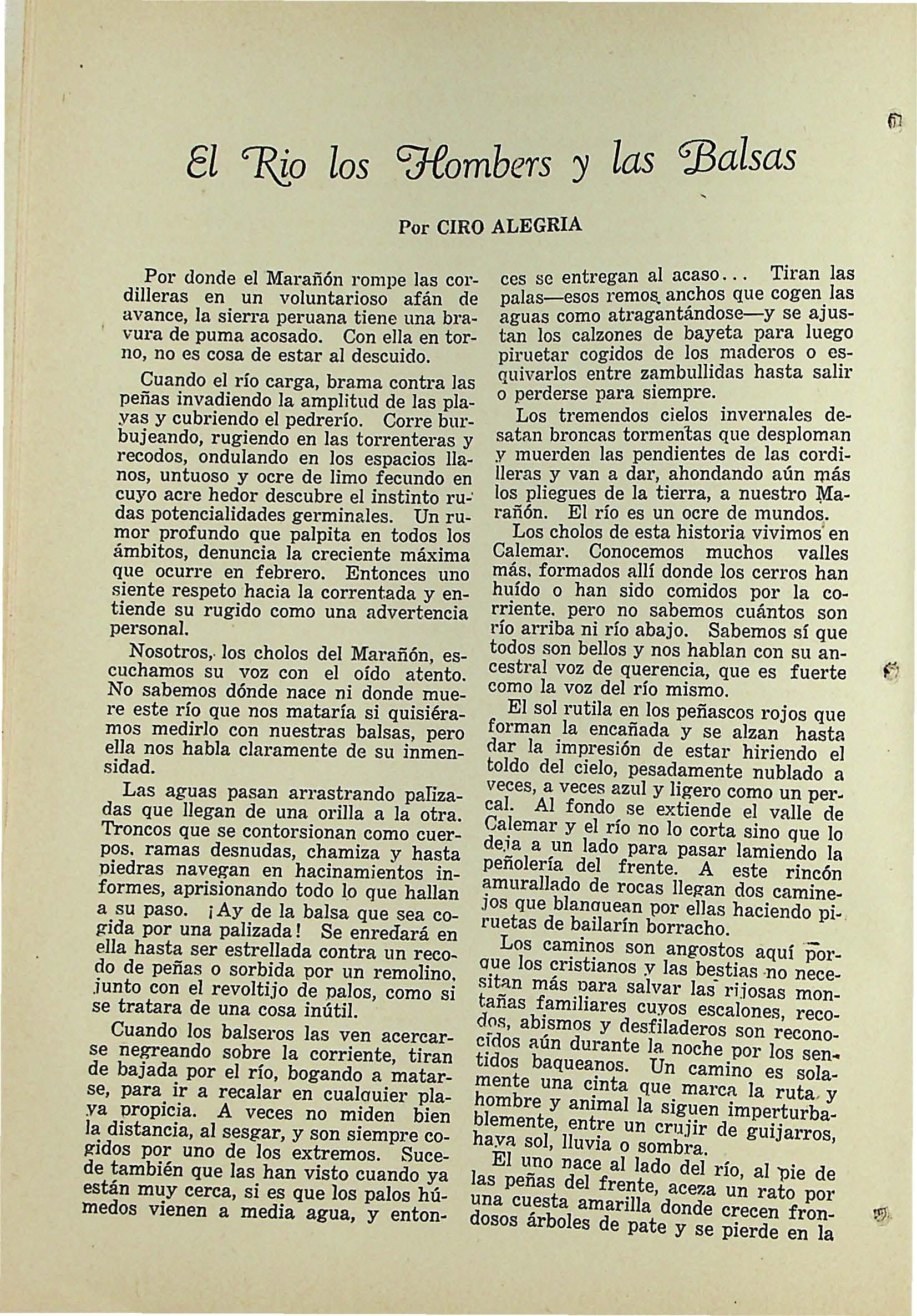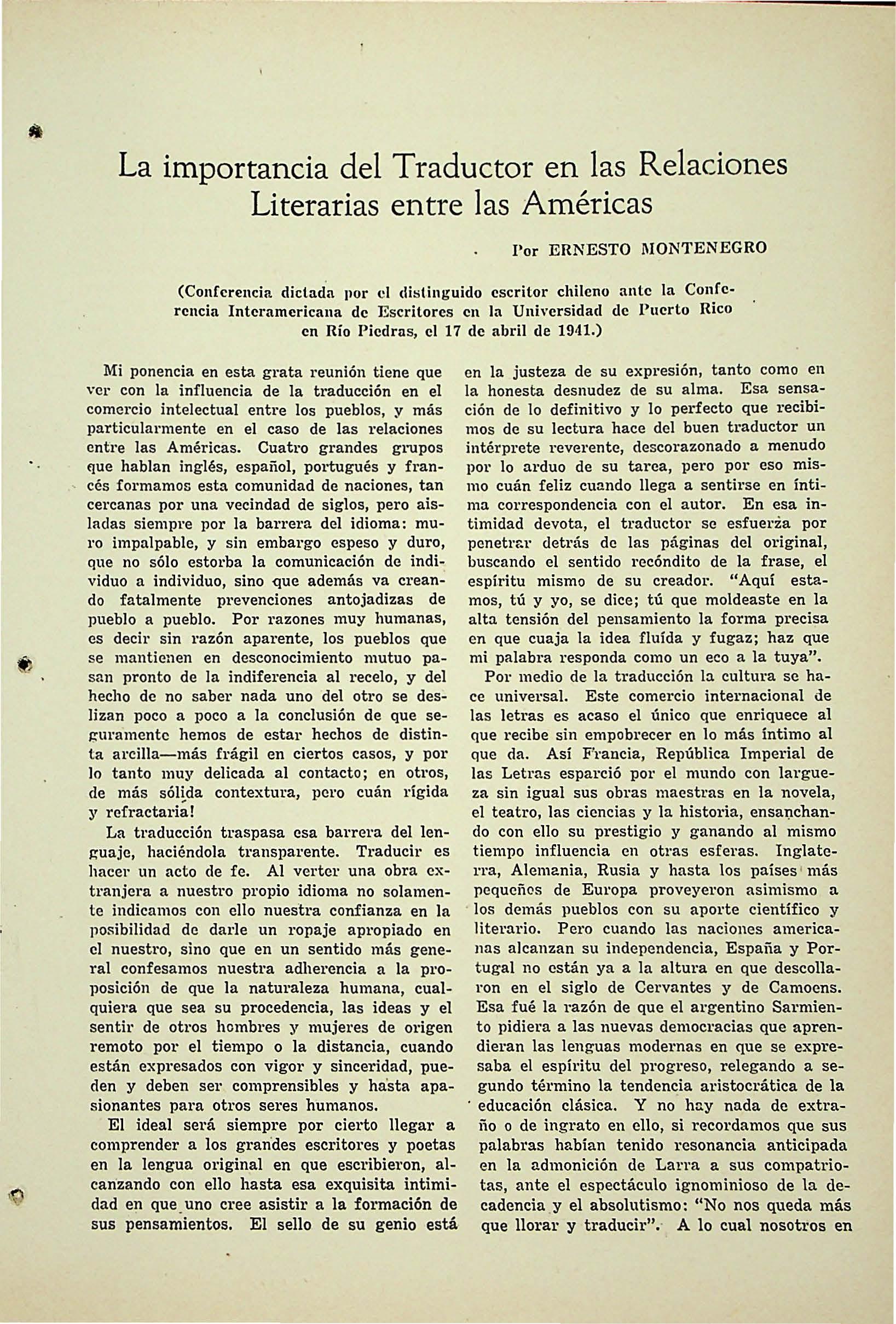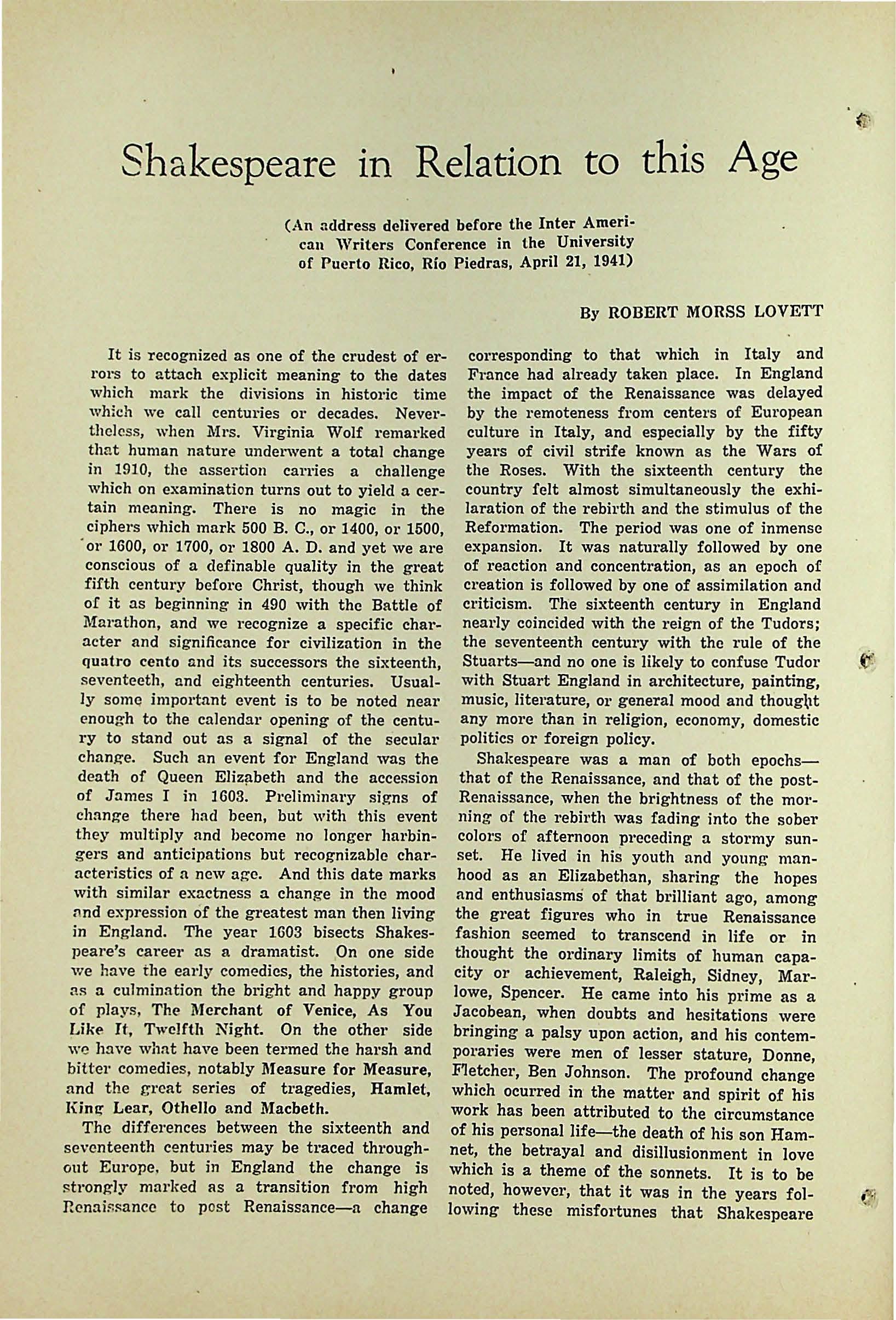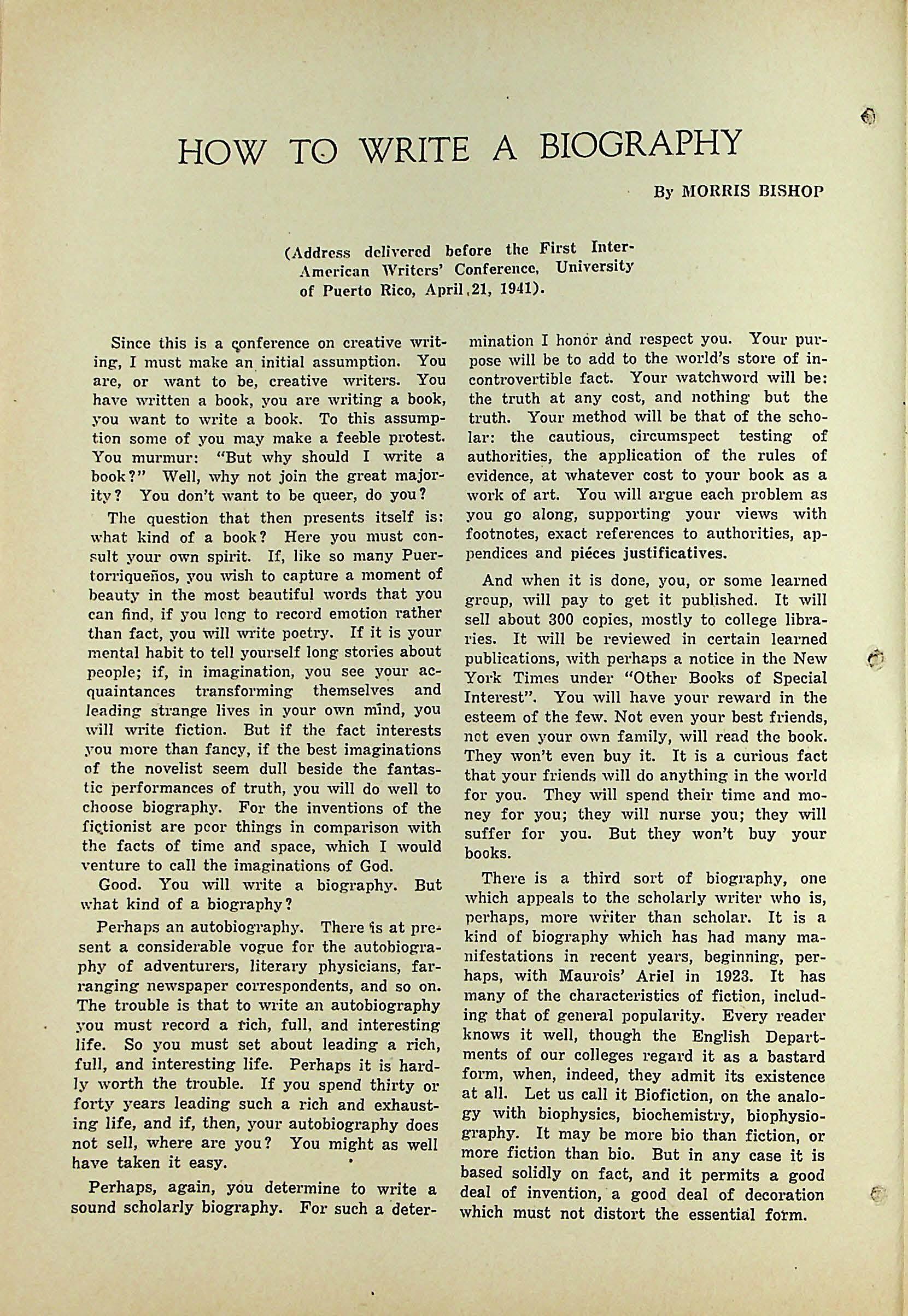
15 minute read
Bishop
HOW TO WRITE A BIOGRAPHY
By l\10RRIS BISHOP
(Addrcss dclh·crcd bcforc tite First InterArncric:m Writcrs' Conferencc, University of Puerto Rico, April ,21, 1941).
Sincc this is a on creative writing, I must make an. initial assumption. You are, or want to be, creative writers. You havc written a book, you are writing a book, you want to write a book. To this assumption some of you may make a feeble protest. You murmur: "But why should I write a book?" Well, why not join the great majority ? You don't want to be queer, do you?
The question that then presents itself is: what kind of a book? Hcre you must conyour own spirit. If, like so many Puertorriqueños, wish to capture a moment of beauty in t.he most beautifu¡ words that you can find, if you long to record emotion rather than fact, you will write poetry. If it is your mental habit to tell yourself long stories about people; if, in imagination, you see yc;iur acquaintances transforming themselves and lending strange lives in your own mínd, you "'ill write fiction. But if thc fact interests more than fancy, if the best imaginations of the novelist seem dull beside the fantastic performances of truth, you will do well to choose biography. For the inventions of the fic.tionist are peor things in comparison with the facts of time and space, which I would venture to call the imaginations of God.
Good. You will write a biography. But what kind of a biography?
Perhaps an autobiogTaphy. There at pre• sent a considerable vogue for the autobiography of adventurers, Iiterary physicians, farranging newspaper correspondents, and so on. The trouble is that to write an autobiography you must record a tich, full, and interesting life. So you must set about Ieading a rich, full, and interesting lifc. Perhaps it is hardly worth the trouble. If you spend thirty or forty years leading such a rich and exhausting Iife, and if, then, your autobiography does not sell, where are you? You might as well have taken it easy.
Perhaps, again, yóu dete1·mine to write a sound scholarly biography. For such a ·deter
mination I honor ánd rcspect you. Your purpose will be to add to the world's store of incontrovertible fact. Your watchword will be: the truth at any cost, and nothing but the truth. Your method will be that of the scholar: the cautious, circumspect testing of authorities, the application of the rules of evidence, at whatever cost to your book as a work of art. You will argue each problem as you go along, supporting your views with footnotes, exact references to authorities, appendices and piéces justificatives.
And when it is done, you, or some learned group, will pay to get it publ.ished. It will sell about 300 copies, mostly to college libraries. It will be reviewed in certain learned publicatious, with perhaps a notice in tite New York Times under "Other Books of Special Interest". You will have your reward in the esteem of tite few. Not even your best friends, uot even your own family, will rend tite book. They won't even buy it. It is a curious fact that your frieuds will do anything in the world for you. Thcy will spend their time and money for you; they will nurse you; they will suffer for you. But they won't buy your books.
There is a third sort of biography, one which appeals to the scholarly writer who is, pcrhaps, more wdter titan scholai-. It is a kind of biography which has had many manifestations in recent years, beginning, perhaps, with Maurois' Ariel in 1923. It has many of the characteristics of fiction, including that of general popularity. Ev'ery reader knows it well, though the English Departments of our co!leges regard it as a bastard form, when, indeed, they admit its existence nt all. Let us call it Biofiction, on the analogy with biophysics, biochemistry, biophysiography. It may be more bio than fiction or more fiction than bio. But in any case it is based solidly on fact, and it permits a good deal of invention, · a good deal of decoration which must not distort the essentiál form.
DE LA UNIVERSIDAD DE PUERTO RICO
47

I nssume, then, that you are thinking of arise will resemble in type the problems that writing a biography. will confront the writer of any biography.
You are now confronted with ;rn important First, you will want to discover if your question: your choice of subject. work has already been done far you. You
Perhaps this will be no problem. Perhaps find that there is only one biography in Enyou have an old and enthusiasm. Perglish, that of Frederick Ober, which was pubhaps there is sorne individual, in history or blished in 1908, and is now out of print. It within your personal experience to whom you was a book of no great pretention: it will not burn to do justice. It may be an ancient sage; interfere with your purpose. There is only it may be your father. In any case, you want one biography in Spanish, that of the Doctors to tell people something important about Perca, published in Caracas in 1929. This is someone you admire, or possibly detest. I a very useful little study, but it is totally unknow no better example of the biography conknown in the United States. It will be a great ceived in !ove, and written with passion, fihelp to you, and no hindrance. delity, and acumen, than Martí el apóstol, by Second, you all the material on our guest of this week, Jorge Mañach. Ponce you can find. You discover that the
More commonly, however, your subject does printed sources are scánty. The early chronot impose itself upen you. You think you niclers tell us something, but rnost of them have the equipment for .your task, and you i·epeat the same stories. A good deal of mahunt a congenia! subject. You wiU seek out, terial on the interminable legal battle between then, someone with whom you can happi!y Ponce de León and Cerón and Díaz, who were spend two or three or a dozen years. The sent from Spain to supersede him, has been reco1·cl of his life must be avai!able to you. published in the Boletín Histórico de Puerto And I would counsel you to give a thought Rico, but this endless argument will be of litto your presumable readers. If you wish to tle interest to the i·eaders of biofiction. intcrest thc average render in the United You must, then, look far new material. States, you should recognize that this mysteIdcally, you should go to Spain and spend a rious person do es not want to read abo u t somefew years hunting in the Archivo de Indias one whose nnme, at Ieast, he does not alrcacly at Seville. This is what Professor R:unírez, know. "But how, then, <loes the average of your Dcpartment of History, did, in the render evcr learn nny na mes at all?" you will preparation of his thesis on the administracry. That is a haffling question, into which tion of Ponce de León. But even if you can I have no time to cntcr. Let it suffice that afford the time and money, you cannot now if you are g·oinrr to attract his nttention, you go to Spain. In the circumstan·ces, I would must tell him about some man whosc namc nlndvise you to cultivate the acquaintance of ready nwnkcs nn echo in his mind. Thcre Professor . Ramírez, who knows more about are, unfortunntely, fcw men connectcd with Ponce and his times than any person now livPuerto Rico who are known to the North ing. Americnn render. There is, however, one: You may find something in the microfilms Ponce de León. Everyone knows bis name, made in the Arcl1ivo de Indias by the Library although everyone mispronounces it. of Congress. You should consult the John It stnnds above innumerable hotels, filling Carter Brown Library in Providence, and the stations, and · orange-drink stands in fabulous Hispanic Museum in New York. Ami you Florida. Everyone knows the great story of should make sorne exploration of Santo Dothe Fountain of Youth. If you choose to tell mingo, far it is rumored that a store of early the life of Ponce ele León you will have won records still exists there, 'Untouched. your first great battle: to create a favorable You must also, of course, soak yourself in predisposition in the mind of your possible the writers of Ponce's time. You should find readers. this a pleasant task. I know of no
Instead of genera!izing further, Jet me now more reaclable than Oviedo, that shrewd, witadopt the case system, in vogue in so many ty, sardonic companion, that superb sto1·yof our educational institutions. Lct me take, teller, that wise and mocking judge of human ns our case, n hypothetical biography of Pon- · behavior. Oviedo deserves to be as well ce de León. The procedure in the particular known as Herodotus, and sorne day he may case may be helpful to those who are attemptbe. The other early chroniclers, Herrera, Peing other subjects; the special problems that dro Martir, Las Casas and the rest, hnve left 1

us precious records of fact. You will read thcm ali, for what they say of Ponce, and for what they tell of the life and mind of the conquistadores, the habits of the Indians, the En cualesquier peligros el más presto, No estremos grandes de· valiente, Enemigo de amigos de regalos, Pero muy envidiado de los malos. nature of the new lands, and ali the background for your tale.
You have, then, your material in hand. your problem now is: how to expand the few kncwn facts about Ponce into a three-dollar book?
One wny is to load your work with back- ¡;round, local color, and authentic but unreJated stories. We know, for instance, that Ponce carne over with Columbus in 1493-and that is ali we do know. You can spend three pages describing the farewell to Cádiz, and a chapter on thc crossing of the Atlantic. "No doubt Ponce saw ... " you say, and then you !et yourself go on tossing caravels, dolphins, and flying fish.,The trouble with this method is that you fill your book with padding, and cven the uncritical render recognizes it as padding. Before he is half through the book he is sick of your no doubts, and assuredlies, ::md if the young Ponce's experiences was t.hat of a writer of 1542.
But if you are writing biofiction and not pure biography, you have another recourse. You may frankly invent. Not capriciously, however. Good biofiction is distinguished from bad by soundness oí invention, based on thorough knowledge, determiped by reasonable probability. You know ali that can be known about Poncc, about his background, about the
Force your imagination. Picture Ponce de León Yividly to yourself. Wake up at night You must also put in plenty of background. and think about him. .Get him clear; work Picture the island as it probably was in 1500, hai·d. We haven't much to go on, beside the not as it is today. Remember that the flora infcrence from bis actions. Oviedo calls him and fauna have enormously changed; most of "honrado caballero y noble persona". Casteyour trees and flowers and animals have been llanos, the backwoods Ariosto, who was of the introduced from other parts of the world. next generation, describes him thus: Put in plenty oí insects; North Americans !ove to read about insects. Play up Ponce's Algo fué rojo, de gracioso gesto, life in Hispaniola from 1493 to 1508, imporAfable, bien querido de su gente, tant youthful years. Sprend yourself on the En todas proporciones bien compuesto, life of the Indians, for Ponce was the friend Sufridor de trabajos grandemente, and protector of these vanished aborigines.
Build up the fine secondary characters. Of his wife we know only that she was a "moza de un mesonero" in Hispaniola. Here you will have to use a lot of creative imagination. But there is the great Columbus himself, about whom it is possible to hold various judgements. You must make one and stick to it. And there is Columbus's son Diego, nervous, pettifogging, trying in vnin to fill bis father's shoes, and to prove bis worth by 01·ders and decorations. An Cristóbal de Sotomayor, the fine gentleman, thc courtier too gentle for the wilds, wearing the shreds of bis court clothes in the dripping jungle. And Diego Salazar, the roaring swashbuckler, whom the Indians feared more than a hundred others, even when he lay crippled by the lecher's plague. And Juan González, the lengua, who ran naked with the Indians and assisted in their councils. And that great character, Becerillo, the red dog with black muzzle, who picked out any wanted Indian from a group, and brought him back alive or tore him to bits, as commanded. He received a crossbowman's pay and a half on the books. You must know: the fine stories about Becerillo; they must be part of your island !ore. But perhaps you do not know the quaint description of him by Castellanos: lifc oí the conquistadores and the Indians. i\fake them talk. Invent probable, reasonable conversations. Go further and invcnt incidents that might well have occurred, and that are illustrative of character and behavior. If you go still farther and invent characters, you are really getting into the realm of historical fiction. Al palo va venciendo nuestro hierro, A las macanas duras el cuchillo; Ayudaba también un cierto perro, Llamado según dicen Becerillo, El cual traía ya todo su cerro No menos colorado que amarillo; Del cual perro nos han contado cosas Que se pueden tener por espantosas.
DE LA UNIVERSIDAD DE PUERTO RICO
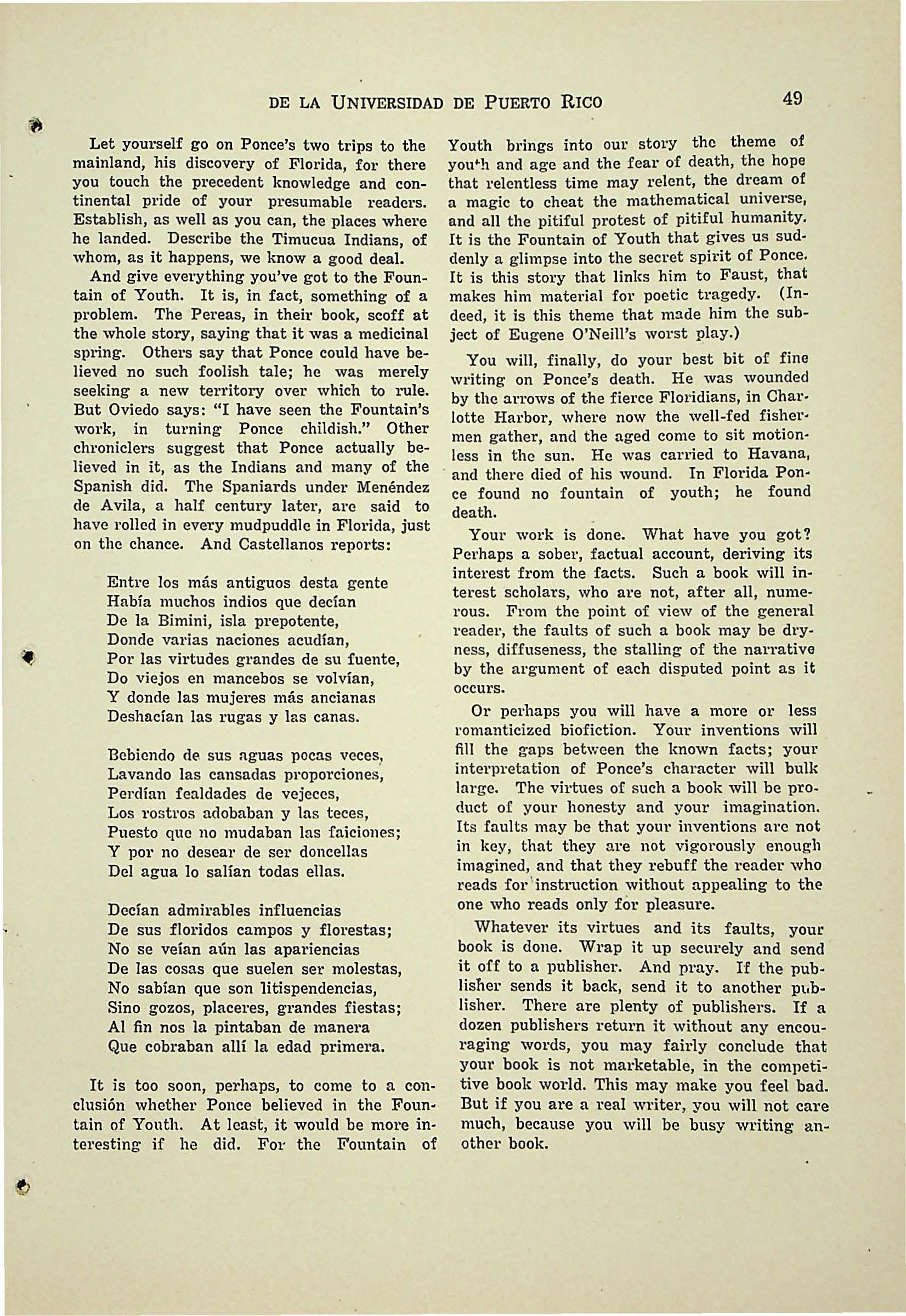
Let yourself go on Ponce's two trips to the Youth brings into om· story thc themc of mainland, his discovery of Florida, for there you•h anel ag·e and the fear of death, the hope you touch the precedent knowledge and conthat relentless time may relcnt, the dream of tinental pride of your presumable readcrs. a magic to cheat the mathcmatical universe, Establish, as well as you can, the places where nnd ali the pitiful protest of pitiful humanity. he landed. Describe the Timucua Indians, of It is the Fountain of Youth that gives us sud· whom, as it happens, we know a good deal. denly a glimpse into the secret spirit of Ponce.
And give everything you've got to the FounIt is this story that links him to Faust, that tain of Youth. It is, in fact, something of a makes him material for poetic tragedy. (Inproblem. The Pereas, in theit· book, scoff at deed, it is this theme that made him the subthe whole story, saying that it was a medicinal ject of Eugene O'Neill's worst play.) sp1ing. Others say that Ponce could have believed no such foolish tale; he was merely seeking a new territory over which to rule. But Oviedo says: "I have seen the Fountain's work, in turning Ponce childish." Other chroniclers suggest that Ponce actually believed in it, as the Indians and many of the Spanish did. The Spaniards under Menéndez de Avila, a half century later, are said to have rolled in eve1·y mudpuddlc in Florida, just on thc chance. And Castellanos reports: ·
You will, finally, do your best bit of fine writing on Ponce's death. He was wounded by thc arrows of the fierce Flo1idians, in Charlotte Harbor, where now the well-fed fisher• men gather, ami the aged come to sit motion· less in the sun. He was carried to Havana, and there died of bis wound. In Florida Pon· ce found no fountain of youth; he found death.
Your work is done. What have you got? Perhaps a sober, factual account, deriving its Entre los más antiguos desta gente Había muchos indios que declan De la Bimini, isla prepotente, Donde varias naciones acudían, Por las virtudes grandes de su fuente, Do viejos en mancebos se volvían, Y donde las mujeres más ancianas Deshacían las rugas y las canas. interest from the facts. Such a book will interest scholars, who are not, after ali, nume· 1·ous. From the point of view of the general render, the faults of such a book may be dryness, diffuseness, the stalling of the narrativa by the argument of each disputed point as it occurs.
Or perhaps you will have a more or less romanticized biofiction. Your inventions will Bebiendo de. sus aguas pocas veces. Lavando las cansadas propo1·ciones; Perdían fealdades ele vejeces, Los rostros adobaban y las teces, Puesto que no mudaban las faiciones; Y por no desear de ser doncellas Del agua lo salían todas ellas. fill the gaps between the known facts; your interpretation of Ponce's character will bulk lnrge. The virtues of such a book will be proc!uct of your honesty and your imngination. Its faults may be that your inventions are not in kcy, that they are not vigorously enough imagined, and that they rebuff the render who reads for" instruction without nppea!ing to the Decían admirables influencias one who reads only for pleasure. De sus floridos campos y florestas; Whatever its virtues and its faults, your No se veían aún las apariencias book is done. Wrap it up securely and send De las cosas que suelen ser molestas, it off to a publishcr. And pray. U the pubNo sabían que son litispendencias, Iisher sends it back, send it to another pt.b· Sino gozos, placeres, graneles fiestas; lisher. There are plenty of publishers. If a Al fin nos la pintaban de manera dozen publishers return it without any encouQue cobraban allí la edad primera. raging words, you may fairly conclude that your book is not marketable, in the competi
It is too soon, perhaps, to come to a contive book world. This may make you feel bad. clusión whether Ponce believed in the Foun· But if you are a real w1·ite1-, you will not care tain of Youth. At lcast, it would be more inmuch, because you will be busy writing anteresting if he did. For the Fountain of other book.

